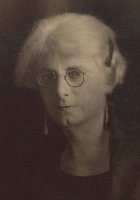Dora Wilcox
Dora Wilcox Poems
When I look out on London's teeming streets,
On grim grey houses, and on leaden skies,
My courage fails me, and my heart grows sick,
And I remember that fair heritage
...
TO break the stillness of the hour
There is no sound, no voice, no stir;
Only the croak of frogs,—the whirr
Of crickets hidden in leaf and flower.
...
Three roads there are that climb and wind
Amongst the hills, and leave behind
The patterned orchards, sloping down
To meet a little country town.
...
AH, my heart, the storm and sadness!
Wind that moans, uncomforted,
Requiem for Love that’s dead’
Love that’s dead!
...
Winter is not yet gone - but now
The birds are carolling from the bough.
And the mist has rolled away
Leaving more beautiful the day.
...
Dora Wilcox Biography
Mary Theodora Joyce Wilcox poet and playwright, was born on 24 November 1873 at Christchurch, New Zealand, daughter of William Henry Wilcox, saddler, and his wife Mary Elizabeth, née Washbourne. Educated privately and at Canterbury College, she contributed to the Bulletin and taught for several years at Armidale, New South Wales, before travelling to England where she published Verses from Maoriland (1905) and Rata and Mistletoe (1911). Dora Wilcox married Jean Paul Hamelius, professor of English at Liège University, Belgium, in London on 14 October 1909 and served with the Voluntary Aid Detachment in London in 1915-18. After her marriage to Moore she devoted much time to helping him to research The Story of Australian Art. She published Seven Poems (1924) and in 1927 won the Sydney Morning Herald's prize for an ode commemorating the opening of the Commonwealth parliament. In 1931 she won a prize for a one-act play, The Raid, while another, The Fourposter, was included in Best Australian One-Act Plays. A contributor to Australian, English and European periodicals, Dora Wilcox also published Samuel Butler in Canterbury, New Zealand (1934), a lecture given to the Sydney branch of the English Association of which she was a patron. She died, childless, in Sydney on 14 December 1953.)
The Best Poem Of Dora Wilcox
In London
When I look out on London's teeming streets,
On grim grey houses, and on leaden skies,
My courage fails me, and my heart grows sick,
And I remember that fair heritage
Barter'd by me for what your London gives.
This is not Nature's city: I am kin
To whatsoever is of free and wild,
And here I pine between these narrow walls,
And London's smoke hides all the stars from me,
Light from mine eyes, and Heaven from my heart.
For in an island of those Southern seas
That lie behind me, guarded by the Cross
That looks all night from out our splendid skies,
I know a valley opening to the East.
There, hour by hour, the lazy tide creeps in
Upon the sands I shall not pace again --
Save in a dream, -- and, hour by hour, the tide
Creeps lazily out, and I behold it not,
Nor the young moon slow sinking to her rest
Behind the hills; nor yet the dead white trees
Glimmering in the starlight: they are ghosts
Of what has been, and shall be never more.
No, never more!
Nor shall I hear again
The wind that rises at the dead of night
Suddenly, and sweeps inward from the sea,
Rustling the tussock, nor the wekas' wail
Echoing at evening from the tawny hills.
In that deserted garden that I lov'd
Day after day, my flowers drop unseen;
And as your Summer slips away in tears,
Spring wakes our lovely Lady of the Bush,
The Kowhai, and she hastes to wrap herself
All in a mantle wrought of living gold;
Then come the birds, who are her worshippers,
To hover round her; tuis swift of wing,
And bell-birds flashing sudden in the sun,
Carolling: Ah! what English nightingale,
Heard in the stillness of a summer eve,
From out the shadow of historic elms,
Sings sweeter than our Bell-bird of the Bush?
And Spring is here: now the Veronica,
Our Koromiko, whitens on the cliff,
The honey-sweet Manuka buds, and bursts
In bloom, and the divine Convolvulus,
Most fair and frail of all our forest flowers,
Stars every covert, running riotous.
O quiet valley, opening to the East,
How far from this thy peacefulness am I!
Ah me, how far! and far this stream of Life
From thy clear creek fast falling to the sea!
Yet let me not lament that these things are
In that lov'd country I shall see no more;
All that has been is mine inviolate,
Lock'd in the secret book of memory.
And though I change, my valley knows no change.
And when I look on London's teeming streets,
On grim grey houses, and on leaden skies,
When speech seems but the babble of a crowd,
And music fails me, and my lamp of life
Burns low, and Art, my mistress, turns from me, --
Then do I pass beyond the Gate of Dreams
Into my kingdom, walking unconstrained
By ways familiar under Southern skies;
Nor unaccompanied; the dear dumb things
I lov'd once, have their immortality.
There too is all fulfilment of desire:
In this the valley of my Paradise
I find again lost ideals, dreams too fair
For lasting; there I meet once more mine own
Whom Death has stolen, or Life estranged from me, --
And thither, with the coming of the dark,
Thou comest, and the night is full of stars.

Dora is a fantastic poet...